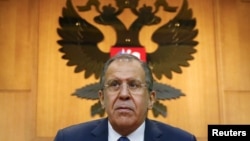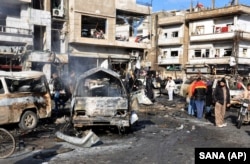Russia appeared to be hardening its position on Syria as it backed government forces making gains against rebels before hoped-for peace talks Friday in Geneva.
The Syrian Observatory for Human Rights reported Tuesday that the Syrian Army, with the help of Russian airstrikes, seized control overnight of a strategic rebel-held town near the border with Jordan.
Syrian opposition groups had signaled they would not participate in talks unless the Russian and Syrian airstrikes were halted and sieges against towns were lifted.
Russian Foreign Minister Sergei Lavrov on Tuesday said Russia's air support had drastically altered the situation in Syria and "helped narrow the area controlled by terrorists." He added, "moreover, we also got a clear picture of who is fighting the terrorists and who is acting in the role of their accomplices, trying to use them in their own egotistic, one-sided goals."
Russia began accusing Turkey of supporting terrorists in Syria after a Turkish warplane shot down a Russian bomber in November along its border. Ankara denies the accusation. Turkey is part of a U.S.-led coalition fighting Islamic State and other terrorist groups in the region.
Disagreement over PYD
Russia labels all the rebel groups fighting its ally, Syrian President Bashar al-Assad, as terrorists and is accused by Assad opponents of targeting rebels instead of Islamic State terrorists. Russia is accused of killing hundreds of civilians with its air campaign, while Moscow claims zero civilian deaths.
Russia has clashed with the U.S.-led coalition on which Syrian opposition groups should participate in peace talks.
Speaking Tuesday at his annual news briefing in Moscow, Lavrov said Syrian Kurds represented by the Democratic Union Party (PYD) should be invited to participate. Turkey, a member of the U.S. coalition, is against the PYD taking part.
The Russian foreign minister said, "Without this participant, the talks cannot bring the result that we want, that is the final political settlement [of the conflict] in Syria."
The PYD is an offshoot of the PKK, the Kurdistan Workers' Party; but, while the PKK is considered by Turkey, the United States and the European Union as a terrorist organization, the United States has supported the PYD in fighting Islamic State terrorists inside Syria.
Turkey's prime minister, Ahmet Davutoglu, said Tuesday they remain strongly opposed to the PYD joining the Syrian opposition at the peace talks. It was not clear if the hardened positions were enough to scuttle the Friday talks.
Rivalries ‘quite visible’
Moscow-based political scientist Victor Mizin says the differences between the sides are stark.
"The rivalries and the divergences in approaches are quite visible. And, I think that ... it is quite evident that they would be also visible in the coming negotiations."
Lavrov denied a report that Moscow had urged Assad to step down, but was rebuffed.
The Financial Times newspaper this month cited sources saying Russia's former head of foreign intelligence, Igor Sergun, made a special trip to Damascus earlier this month to offer Assad asylum if he gave up power.
"I've read the speculations published with reference to late Igor Sergun claiming that he had allegedly made a trip to Damascus to ask Assad to resign," Lavrov said Tuesday. "This is not true. Such a conversation with Assad was not necessary."
Lavrov also dismissed speculation Russia might offer Assad asylum.
"Nobody has asked us for political asylum," Lavrov said, adding, "No offers of the sort have been made."
The U.S.-led coalition was supporting Syrian opposition calls for Assad to leave power, but changed its position to support talks between the two sides as Russia stepped up its military support.
Lavrov painted a bleak picture of global terrorism and alleged Western attempts to contain Russia. He complained of Western dominance and asking Russia for favors, while also claiming that dominance is being eroded and Russia is ready to cooperate with Europe and the United States on other contentious issues, such as implementing a peace deal on Ukraine.
He blamed Kyiv and the West for a lack of progress on the February cease-fire deal made in Minsk. Kyiv and Western governments say Russia's ongoing military support for pro-Russia rebels is to blame.
















